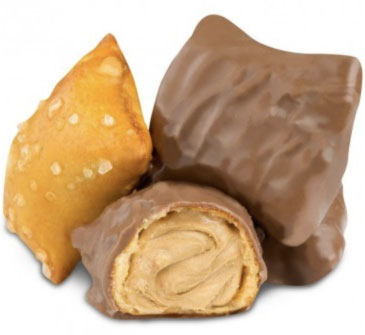4 trends set to impact the snack food industry
During the recent International Peanut Forum, top snacking trends in 2021 were highlighted. As indicated by conference insights along with what’s being reported globally, what we see is a future where functional nutrition takes the cake.
The Trends
Plant-based Functional Nutrition
With a heightened understanding of nutrition, the millennial targeted consumer segment is focusing on the functional benefits that food can provide. According to the National Peanut Board: “Functional foods and beverages that address the needs of ultra-specific niches continue to gain traction. For peanuts, this means a claim growth in products that are labeled GMO-free, gluten-free, low/no/reduced allergen, vegan, or organic.”
In fact, plant proteins and plant-based ingredients are driving innovation across the snack food industry. The industry is moving plant-forward. Globally, product launches with plant-based/vegan claims have grown significantly.
Plant-based indulgence is fueling new product development alongside value proposition marketing. By highlighting what the plant-based ingredients bring into the mix – i.e., “rich and indulgent” flavors and “crunchy” and “smooth” textures – marketers can elevate product messaging.
In addition to free-from and indulgent benefits and features, a rise in the innovation of plant proteins that contain amino acids and perform specific functions, like satiety, muscle repair, weight loss, and energy balance, is expected to present major growth opportunities.
Tailored to Fit
The “tailored to fit” trend can naturally and logically commingle with the plant-based functional nutrition trend. Consumers are seeking snack foods and beverages that fit their unique lifestyles. Moreover, consumers are addressing specific diet and health needs through mindful snacking via products that emphasize features such as sugar free or gluten free.
As reported at the conference, 64% of consumers globally say, “I have found more ways to tailor my life and the products I buy to my individual style, beliefs, and needs.” This is one indication of why lifestyle-specific personalized nutrition services are growing rapidly. As examples, keto (231%) and plant-based snacks (72%) have had explosive average annual growth in 2017-2020.
An emerging trend stemming from this is mood-related food concepts. Suppliers are incorporating functional ingredients like vitamin C, mushrooms, adaptogens, and nootropics to foster a calm headspace and support the immune system. For instance, “Adaptogens and nootropics for keeping you calm.” Claims like this have many different appeals for beauty, replenish/recharge, sleep/rest, etc.
Transparent, Sustainable, Upcycled
In line with healthy and mindful snacking trends, transparent, sustainable, and upcycled traits continue to be desirable. The first eco-label was introduced in the 1990s – and its popularity is coming to the forefront (literally, on packaging). Clean label growth has facilitated meaningful storytelling on packaging.
As consumers learn more about the food they eat, transparency has become a competitive advantage. At the conference, it was reported that 3 in 5 global consumers say they are interested in learning more about where their food comes from and how is it made. This opens channels for storytelling. For example:
- How sustainable is this protein-packed nut and cheese snack food product?
- Are the nuts grown where sustainable farming methods are used?
- Is the cheese from cows who graze outside?
- Are the products from local farms?
- Is the packaging biodegradable or use less plastic than similar products?
Exploring the relationship between food, health, and environment is revitalized with upcycled snacks. Many upcycled snacks are made with vegetable and fruit byproducts. Such products help to reduce food waste and offer nutritious benefits over typical snack foods. Examples include upcycled dried fruit, veggie pulp chips, even upcycled banana snacks dipped in dark chocolate and peanut butter, and more.
This leads to the last snacking trend taking root in 2021…
Product Mashups
Product mashups will influence new product development and provide multisensory experiences across indulgent categories. As reported at the conference, 3 in 5 global consumers say, “I am interested in trying new sensory experiences (e.g., aromas, tastes, textures, colors, sensations).”
Some of the examples showcased at IPF were:
- Planters Breakfast Blends (trail mix combining savory Planters nuts with bursts of sweetness – cinnamon roll or blueberry muffin bites)
- Pringles-flavored instant ramen noodles
- KitKat Pops (which include crispy waffles, milk chocolate—from sustainably sourced cocoa, and either peanut, corn, and chia seeds or hazelnut and cocoa nibs)
- Store brand milk chocolate covered peanut butter pretzels

These types of cross-category innovation do not rest at merging flavors only, but also concepts. Think: candy popcorn that combines M&M’s and popcorn and keto snacks inspired by Thai dishes. Peanuts are a common ingredient in snack food, Thai dishes, and are a great choice for keto dieters. Merging those concepts into a new product is certainly innovative.
These four top snacking trends 2021 – Plant-based Functional Nutrition; Tailored to Fit; Transparent, Sustainable, Upcycled; and Product Mashups – will lead product development for years to come. The unique types of snacks (more creative flavor/concept/texture combinations, functional nutrition) along with new clean label and packaging styles that will arise will be exciting to taste and see.
Related reading: How Consumer Emotions are Shaping the Future of the Food and Beverage Industry





